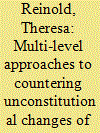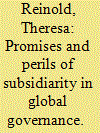| Srl | Item |
| 1 |
ID:
167098


|
|
|
|
|
| Summary/Abstract |
This article assesses the impact of multi-level approaches to the problem of unconstitutional changes of government (UCGs) on the rule of law at the national and global level. Based on a single-case study of the 2016 Gambian UCG, this article concludes that multi-level governance tends to strengthen the rule of law at the national level, but only if certain conditions are met. These include an agreement about the rules of the road regulating how the different layers of governance interact – subsidiarity v. precedence for organizations from higher levels of governance – and the definition of a common purpose. Such unity of purpose is easier to attain if the (geo)political stakes of a crisis are relatively low, the prospects of success of a military intervention high, and if the perpetrators of the UCG have forfeited their legitimacy both locally and globally. This prevents them from exploiting institutional rivalries and shrinks their space for diplomatic manoeuvre and thus their ability to use forum shopping for their benefit. If these conditions are met, then multi-level responses to UCG will strengthen the rule of law at the domestic level, while at the same time potentially undermining the rule of law at the global level.
|
|
|
|
|
|
|
|
|
|
|
|
|
|
|
|
| 2 |
ID:
168490


|
|
|
|
|
| Summary/Abstract |
In the messy world of global governance, the principle of subsidiarity has the potential to order relations between different layers of governance as well as compensate for the legitimacy deficit of global governance institutions. However, subsidiarity has received surprisingly little scholarly attention in the discipline of International Relations. This article therefore seeks to examine the promises and perils of subsidiarity in global governance by adducing empirical evidence from Africa, a region which has authored norms and policies that often contest global norms and institutions. Based on two case studies of pro-democratic intervention in The Gambia and court proliferation at the (sub-)regional levels, the article concludes that while subsidiarity may strengthen democracy and the rule of law at the national level, it may also undermine the rule of law at the global level, as well as dilute fundamental global norms that serve to protect basic human rights. At the same time, subsidiarity provides opportunities for normative innovation, which suggests that more attention needs to be paid to the law-generating effects of subsidiarity and to the Global South as an agent of change in international law and global governance.
|
|
|
|
|
|
|
|
|
|
|
|
|
|
|
|